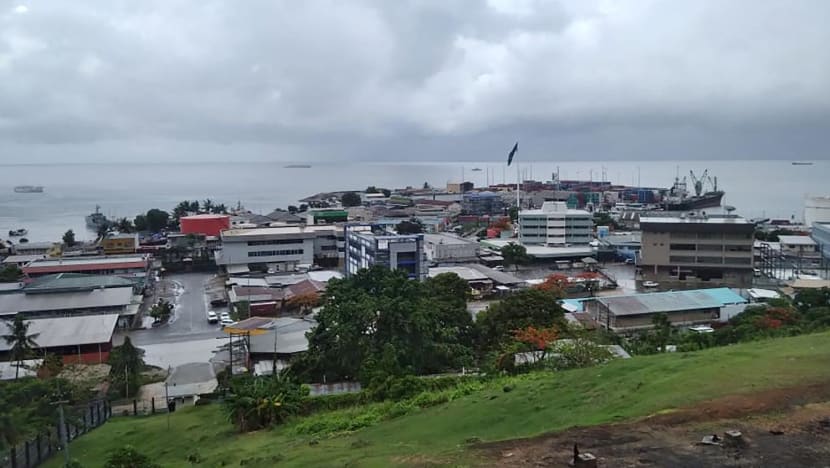Why the Solomon Islands’ China pact has US riled

The streets of downtown Honiara, Solomon Islands taken on Dec 6, 2021. (Photo: AFP/ Mavis Podokolo)
The Solomon Islands has sent shock waves across the Pacific by signing a security cooperation pact with China. The island nation had faced pressure from its traditional allies, Australia and the US, to reject the deal as they seek to counter China’s growing influence in the region.
The Solomon Islands’ leader told his parliament the pact wouldn’t undermine the “peace and harmony of our region”. That hasn’t squelched concerns about a possible Chinese naval base just 2,000km from Australia.
WHAT'S THE PACT ABOUT?
Chinese Foreign Ministry spokesman Wang Wenbin said on Apr 19 - the day the pact was announced - that the cooperation would include “maintenance of social order, protection and safety of people’s lives and property, humanitarian assistance and natural disaster response, to help the Solomon Islands strengthen capacity building and safeguard its own security”.
According to an Associated Press report, Prime Minister Mannesseh Sogavare told his parliament in Honiara a day later that it will allow China to send police and military personnel to the Solomon Islands “to assist in maintaining social order”. Chinese warships also could stop in port there for “logistical replenishment.”
Sogavare has insisted the pact would not allow China to construct a military base - a concern that arose after a draft copy was leaked online in late March - and has strongly asserted his country’s right to an independent foreign policy.
HOW DID THE DEAL COME ABOUT?
Chinese diplomats have been wooing Sogavare for years and he has reciprocated by strengthening relations with the Asian superpower, including a contentious decision to switch the country’s diplomatic recognition to Beijing from Taipei in September 2019.
That change has been one of the factors in growing domestic unrest between Sogavare’s government and the province of Malaita, the most-populous isle with a third of the nation’s 650,000 people.
Daniel Suidani, who leads Malaita, has been a vocal critic of the switch to the decision to cut diplomatic ties with Taiwan.
Last year, anti-China protesters demanded Sogavare’s resignation, the Australian Broadcasting reported, while the Solomon Islands Herald said shops in the capital’s Chinatown were looted and damaged.
Sogavare asked for Australian troops to help quell the unrest even as he accused “other powers” of encouraging the anti-China sentiment. A few months later came the security pact with China.
WHAT'S THE SIGNIFICANCE?
China has long been trying to beef up its presence in the Asia-Pacific, including building up its navy and constructing military facilities on disputed islands in the South China Sea.
War hawks in Australia and the US have warned that the security cooperation pact could pave the way for Chinese military hardware and eventually a naval base in the South Pacific, although that’s not the immediate case now.
Related:
WHAT ABOUT THE US?
The US has long touted its alliances in the Pacific, including the sealing of a new defence accord with Australia and the UK last year, known as Aukus, and an older grouping known as the Quad that includes Australia, Japan and India, as part of efforts to counter the growing economic, political and military influence of China in the region.
News of the pact came days before the Biden administration’s East Asia czar Kurt Campbell was to visit the islands as part of a US delegation to discuss partnerships to “deliver prosperity, security, and peace across the Pacific Islands and the Indo-Pacific”.
In Beijing, Wang Wenbin criticised Western efforts to block the pact, saying: “We must point out that South Pacific island countries are not a backyard of any country, still less a pawn for geopolitical rivalry.”
WHAT DOES THIS MEAN FOR AUSTRALIA?
The Australian government, to which the South Pacific region has long looked for support, expressed concern that the deal could “undermine stability”.
More immediately, it could become an issue in Australia’s upcoming national elections.
Prime Minister Scott Morrison has portrayed himself as tough on national security, but the diplomatic loss is providing ammunition for attacks on his government’s record. Shadow Foreign Minister Penny Wong called the signing of the security agreement the “worst failure of Australian foreign policy in the Pacific since the end of World War II”.












